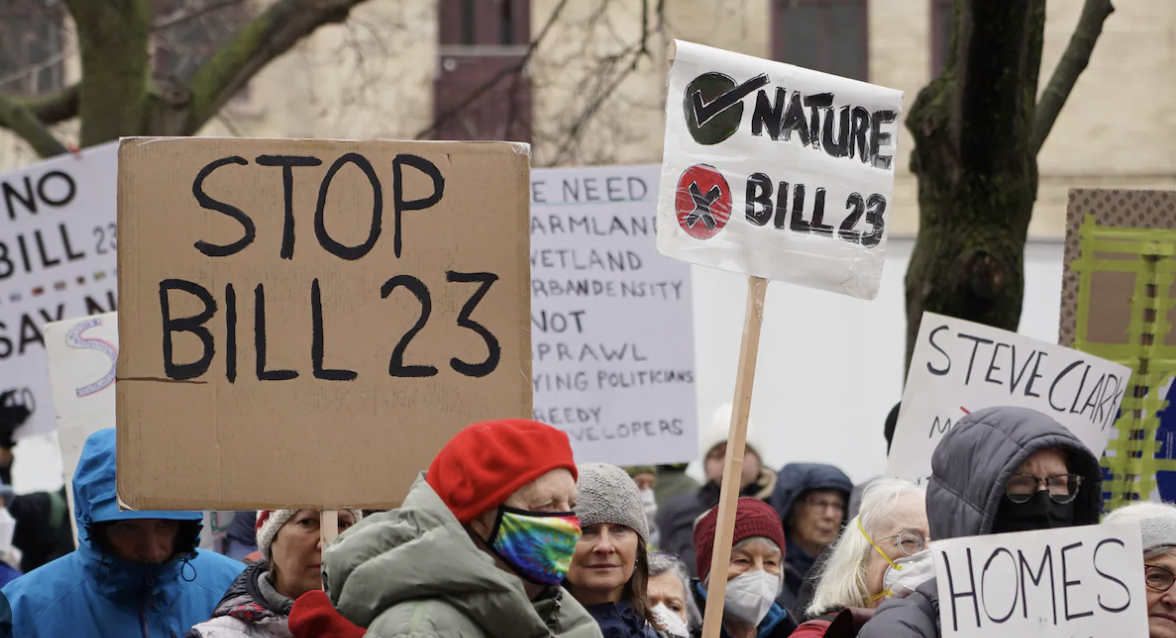What is Bill 23?
Image courtesy Greenbelt Foundation
Ontario's Bill 23, the More Homes Built Faster Act was passed in November of 2022 and allows the province to override local planning decisions and increase the speed and density of housing development. The bill seeks to address the housing crisis in Ontario, but environmental activists argue that it will result in the destruction of currently undeveloped areas with the removal of important protections for existing green spaces and natural habitats.
The More Homes Built Faster Act does have the potential to bring about some positive environmental changes. The bill is specifically designed to reduce urban sprawl by encouraging the development of more compact, mixed-use communities. This type of development uses fewer resources and reduces the need for transportation, which could lead to a reduction in air and water pollution. In addition, by using sustainable building practices, such as the use of renewable materials, the bill could also help reduce the negative impacts of climate change. But this might only happen in a near perfect world.
What are the negative environmental impacts?
Image courtesy of Canadian Centre for Housing Rights
While the bill could offer some environmental benefits, it could also have some drawbacks. The development of new communities could lead to the destruction of green spaces and important wildlife habitats. In addition, if the new communities are not designed with sustainability in mind, they could have long-term negative environmental impacts. For example, if the communities do not have access to public transportation or green spaces, they could lead to increased air and water pollution.
One of the main concerns with the Act is that it has weakened Conservation Authorities’ ability to protect rivers, streams, and wetlands from development in Ontario’s Greenbelt and elsewhere across the province. The Act allows developers to bypass the existing regulations around development in areas that are close to natural and sensitive habitats, and this will lead to a decrease in the quality of these formerly protected areas and their inhabitants, some of which are already on the endangered species list.
Another issue with the Act is that it has made it easier for developers to clear-cut forests in order to make room for more housing. This can have a negative effect on the local ecosystems, as it can reduce the amount of habitat available for wildlife and can increase the amount of runoff into nearby rivers and streams.
The Act also removes the development fees that municipalities have long relied upon to build the necessary infrastructure to support new housing developments, in essence, hamstringing local governments’ ability to raise the funds without increasing property taxes on local residents. The question is often as simple as, “Where do we send all the poop?”, let alone afford to build all the roads, parks, and public services?
Finally, the Act has increased the number of vehicles on the roads, which can then exacerbate the air pollution, noise pollution, water pollution, and lead to a decrease in the local quality of life. This is particularly concerning in areas that are already struggling with air and noise pollution for their residents.
Taking action against Bill 23
Image courtesy CBC
In order to ensure that the More Homes Built Faster Act does not have a detrimental environmental impact, it is important that local governments take action. They can create regulations that ensure that developers use sustainable building practices and take measures to protect green spaces and wildlife habitats. In addition, these governments can ensure that the proposed communities are designed with sustainability in mind, with access to public transportation, green spaces, and other amenities that promote a healthy and sustainable lifestyle.
Overall, while Bill 23 was meant to increase housing availability and affordability, it has come with some serious environmental costs. It is important to be aware of the impacts of this Act, and to take action in order to protect our local environments.
A grassroots organization advocating for the repeal of Bill 23 has been created where individuals are welcome to support the cause. You can learn more and mobilize with them here.
Environmental Defence is also hosting numerous rallies across the province which you can join and find more details for here.
If you wish to learn even more about the negative environmental impacts associated with Bill 23, The Narwhal has published an hour-long video discussion on the issues, and you can watch it here.




